BusinessEurope Headlines No. 2019-38
Economic prosperity essential to let people and planet thrive
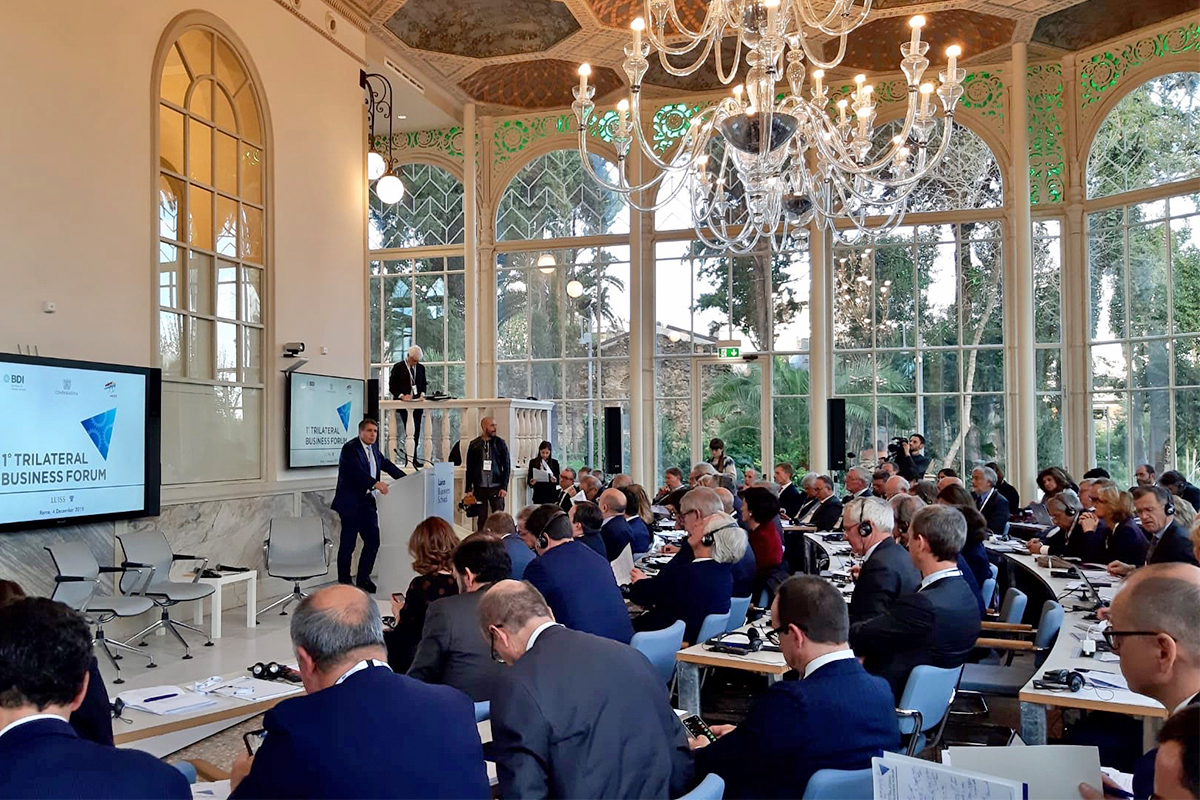
“The new Commission started their work this week and I think with President Ursula von der Leyen we have a very dynamic, pro-European and strategic leader heading this team. Last week’s strong vote in the European Parliament has been an important push to let this Commission start their work strengthened”. This was a message of Director General Markus J. Beyrer at the first Trilateral Business Forum of BusinessEurope members, the national business associations from Italy (Confindustria), Germany (BDI) and France (MEDEF) which took place on 4-5 December in Rome. “Three weeks ago, we presented our priority paper that we based on three pillars: Prosperity, People and Planet. This is the basis of our program for 2019-2024: if we want people and planet to thrive, economic prosperity is essential, and we have to be united in tackling the many issues on our table”, said Beyrer.
Contacts: Jasmin Ploner
Prosperity, people, planet – three pillars for a successful EU
We are at the start of a new political cycle for 2019-2024. It's more urgent than ever to come up with the right policies. Watch what business proposes and read our priorities: www.euyourbusiness.eu
Our comment
How to unleash SMEs potential to export
By Daniele Olivieri, Senior Advisor for Entrepreneurship and SMEs
 In the coming years, it is estimated that 90% of global growth will originate outside the European Union and developing and emerging markets are expected to account for 60% of world GDP by 2030. Going international increases the competitiveness of companies, both large and small-medium sized (SMEs), reinforces sustainable growth and creates millions of jobs in Europe. Nonetheless, many SMEs in the EU struggle to internationalise their business even with an open and fair-trade framework in place. Only one out of four EU SMEs are involved in export activities and an even smaller share exports beyond the EU, the main reasons being, inter alia, the difficulty of identifying business partners, complicated administrative procedures, different regulations in other countries and high delivery costs.
In the coming years, it is estimated that 90% of global growth will originate outside the European Union and developing and emerging markets are expected to account for 60% of world GDP by 2030. Going international increases the competitiveness of companies, both large and small-medium sized (SMEs), reinforces sustainable growth and creates millions of jobs in Europe. Nonetheless, many SMEs in the EU struggle to internationalise their business even with an open and fair-trade framework in place. Only one out of four EU SMEs are involved in export activities and an even smaller share exports beyond the EU, the main reasons being, inter alia, the difficulty of identifying business partners, complicated administrative procedures, different regulations in other countries and high delivery costs.
However, when talking about SMEs exporting, we should not forget that their international activities do not only concern direct exports of goods. On top of over hundreds of thousands of SMEs exporting goods and, increasingly, services, many more SMEs play a key role for the economy by supplying intermediate goods to typically larger firms – domestic or foreign-owned – which then export. Global value chains (GVCs) have indeed become a dominant feature of the world economy and provide strong opportunities for SMEs. Thanks to GVCs, SMEs can enhance their productivity and scale up, and specialise in specific segments of production and sophisticated products, rather than having to master all processes required to produce finished goods. GVCs accelerate innovation, facilitate spill-overs of technology and know-how. Also, GVCs help reducing the cost of entering a new market, by reducing or eliminating the fixed costs of exporting or adopting costly emerging technologies or legal overheads, which typically weighs more heavily on SMEs than on larger firms.
Despite these opportunities, SMEs are still facing some key challenges. For example, the speed and scale of global interactions, the emergence of new players and new political developments bringing dangerous protectionist trends have changed the nature of GVCs. And in a world dominated by GVCs, the cost of protection can be higher than generally understood. To give one example, tariffs are cumulative when intermediate inputs are traded across borders multiple times. Moreover, SMEs face some challenges typically related to their nature, such as less knowledge-based capital and accumulated technology, making it harder for them to invest in costly digital solutions, multiple filings, regulatory and technical differences across countries, local intellectual property enforcement.
Given this premise, the key question to answer is: how can we enhance the role of SMEs within GVCs in a changing world?
A range of internal and external factors influence SMEs’ ability to participate in global markets. From an overall perspective, to support SMEs in GVCs, politicians and policy-makers at EU and national level should do what is in their power to tackle the protectionist trends and maintain a flourishing economy. Greater international cooperation is crucial, if we want to identify global solutions to global challenges.
The EU trade policy must support the full range of economic activities through which Europeans create and sell value. That includes both the manufacturing of components and final products, which are vital as well as services, design and marketing, assembly, distribution, and maintenance. At the same time, trade policy must be supported by domestic structural reforms and flanking policies including less red tape, research and innovation, improved access to finance and more investment in infrastructure. This is essential to further strengthen the Union’s capacity to take advantage of open markets.
Some further ideas on how to support SMEs in GVCs emerged during a workshop focusing on the role of SMEs within GVCs, organised by BusinessEurope during the 2019 SME Assembly in Helsinki, featuring the participation of two entrepreneurs in the field of goods and services, among whom the Chair of BusinessEurope’s Entrepreneurship and SME Committee, Anna-Lena Bohm, as well as representatives from the European Commission and a renowned policy research think tank dedicated to trade policy. The dialogue between public authorities, large companies and SMEs is crucial and should aim to provide the right expertise abroad in order to support trade promotion and to promote the development of existing business ecosystems with SME participation, and the creation of new ecosystems. One key point discussed was the potential contribution of GVCs to sustainability and creation of a good balance between economic, environmental and social objectives. Being part of GVCs in which large companies promote sustainable trade helps SMEs embrace sustainability. In this regard, the EU should continue its efforts on how to better encourage and promote the implementation of sustainability provisions in free trade agreements. At last, reducing barriers to entrepreneurship in services sectors and tapping the potential of digitalisation and free data flow were defined as means to cut administrative and trade costs down and support broader participation of SMEs in GVCs.
In conclusion, public support should use all instruments at disposal to ensure the effectiveness of trade policy allowing to promote access to markets, modern rules and sustainable trade. Companies, especially SMEs, have an important role to play and want to reap the opportunities generated by trade and GVCs. SMEs have an excellent potential to grow, create jobs and stimulate innovation, but their export capacity must be further enhanced and better supported.
Contact: Daniele Olivieri
New publication: Towards a simplified, sustainable and robust VAT system
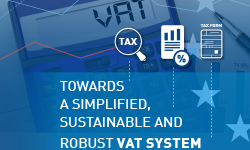 The importance of value-added taxes (VAT) to the European economy cannot be underestimated. The European Commission estimates that over €1 trillion of VAT was collected in the EU in 2017 – equivalent to 7% of the EU’s total GDP, a share that has been growing for over a decade - or nearly one fifth of the EU’s total tax revenue. Read how VAT rules can be improved for companies, especially SMEs in our new brochure.
The importance of value-added taxes (VAT) to the European economy cannot be underestimated. The European Commission estimates that over €1 trillion of VAT was collected in the EU in 2017 – equivalent to 7% of the EU’s total GDP, a share that has been growing for over a decade - or nearly one fifth of the EU’s total tax revenue. Read how VAT rules can be improved for companies, especially SMEs in our new brochure.
![]() Contact: Pieter Baert
Contact: Pieter Baert
Are you at COP25 in Madrid? Join BusinessEurope's side events

Industry strategies for climate ambition: national perspectives and next steps
10 December | 18:00-19:30
IETA Pavilion, Side Event Room
Industry associations from Europe, Brazil and Indonesia will showcase their experiences and ideas on effective cooperation with their national governments on climate policy. Speakers include: Holger Lösch, Deputy Director General of Federation of German Industries (BDI) and Yvon Slingenberg, Director at DG Climate Action, European Commission. More info
Industrial decarbonisation: Key examples from EU business
12 December | 12:30-14:00
EU side events pavilion, room Brussels
Companies from around Europe will pitch the cutting-edge technologies and processes they are developing for deep greenhouse gas emissions reductions in heavy industry, mining and refining. Speakers include: Olivier Imbault, Senior Vice President, Air Liquide, and Volkmar Pflug, Chief Energy Economist, Siemens. More info
Contact: Leon de Graaf
A new mechanism to settle investment disputes in Europe is needed
 “Investment is crucial at a moment the European economy is facing the challenges of decarbonisation and digitalisation. Most of these investments will be done by the private sector. But there is a strong competition worldwide for investments and companies look carefully at the conditions to invest, namely if there is a sound and non-discriminatory legal system investors can use to protect and enforce their rights”, said BusinessEurope International Relations Director Luisa Santos at a stakeholder workshop on intra-EU Investment organised on 3 December by the European Commission’s Directorate-General for Financial Stability, Financial Services and Capital Markets Union. The termination of intra-EU bilateral investment treaties, due to happen by the end of this year, threatens to open a legal vacuum in the protection of investments and investors’ rights within the EU. Therefore, the European Commission should propose a single piece of EU legislation to codify investment protection provisions together with a binding mechanism to settle disputes between investors and states. “To ensure the continuity of intra-EU investment, companies need to rely on a new dispute resolution mechanism that is reliable, transparent, independent, efficient, cost-effective and enforceable. Otherwise European companies wishing to invest in Europe will be in disadvantage vis-à-vis foreign investors who enjoy the benefits of international bilateral investment treaties”, Santos added.
“Investment is crucial at a moment the European economy is facing the challenges of decarbonisation and digitalisation. Most of these investments will be done by the private sector. But there is a strong competition worldwide for investments and companies look carefully at the conditions to invest, namely if there is a sound and non-discriminatory legal system investors can use to protect and enforce their rights”, said BusinessEurope International Relations Director Luisa Santos at a stakeholder workshop on intra-EU Investment organised on 3 December by the European Commission’s Directorate-General for Financial Stability, Financial Services and Capital Markets Union. The termination of intra-EU bilateral investment treaties, due to happen by the end of this year, threatens to open a legal vacuum in the protection of investments and investors’ rights within the EU. Therefore, the European Commission should propose a single piece of EU legislation to codify investment protection provisions together with a binding mechanism to settle disputes between investors and states. “To ensure the continuity of intra-EU investment, companies need to rely on a new dispute resolution mechanism that is reliable, transparent, independent, efficient, cost-effective and enforceable. Otherwise European companies wishing to invest in Europe will be in disadvantage vis-à-vis foreign investors who enjoy the benefits of international bilateral investment treaties”, Santos added.
Contact: Luisa Santos
Innovation principle – let’s make it happen
 “The innovation principle is key to the quality and future-proof nature of EU policy”, said Alexandre Affre, Director for Industrial Affairs, at the High-Level Conference on the innovation principle organised by the Finnish EU Presidency on 3 December. For this reason, the EU must fully implement the innovation principle: companies need a ‘fit-for-innovation’ regulation to upscale their research and innovation investments in Europe. Affre suggested that the Commission should provide guidance on the interpretation of the innovation principle and its relation with the precautionary principle.
“The innovation principle is key to the quality and future-proof nature of EU policy”, said Alexandre Affre, Director for Industrial Affairs, at the High-Level Conference on the innovation principle organised by the Finnish EU Presidency on 3 December. For this reason, the EU must fully implement the innovation principle: companies need a ‘fit-for-innovation’ regulation to upscale their research and innovation investments in Europe. Affre suggested that the Commission should provide guidance on the interpretation of the innovation principle and its relation with the precautionary principle.
Contact: Carolina Vigo
Europe and Africa must cooperate to prepare for a changing labour market
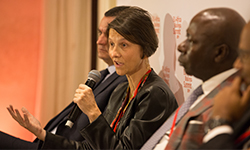 “Labour markets in Africa and Europe are changing, and education and training has a fundamental role to play in ensuring that companies continue to be competitive, productive and innovative”, said Thérèse de Liedekerke, Deputy Director General of BusinessEurope, at the EU-Africa Business Summit held in Marrakesh on 28-29 November. She participated in a panel debate that fostered discussions between high-level representatives of European, Moroccan, Egyptian and Senegalese business federations as well as development cooperation agencies and academia to explore what skills will be needed in Africa in view of a transforming labour market and how the public and private sectors can cooperate to ensure that the right education policies are in place. “Universal access to education as well as demand-driven vocational education and training schemes must be further promoted in cooperation with the European and African private sectors”, de Liedekerke pointed out. With the rise of digital technologies and services, she added: “especially digital skills will be key in the future. Europe and Africa face many of the same challenges and we can work together to be ready for the rapidly evolving labour market of the digital age”.
“Labour markets in Africa and Europe are changing, and education and training has a fundamental role to play in ensuring that companies continue to be competitive, productive and innovative”, said Thérèse de Liedekerke, Deputy Director General of BusinessEurope, at the EU-Africa Business Summit held in Marrakesh on 28-29 November. She participated in a panel debate that fostered discussions between high-level representatives of European, Moroccan, Egyptian and Senegalese business federations as well as development cooperation agencies and academia to explore what skills will be needed in Africa in view of a transforming labour market and how the public and private sectors can cooperate to ensure that the right education policies are in place. “Universal access to education as well as demand-driven vocational education and training schemes must be further promoted in cooperation with the European and African private sectors”, de Liedekerke pointed out. With the rise of digital technologies and services, she added: “especially digital skills will be key in the future. Europe and Africa face many of the same challenges and we can work together to be ready for the rapidly evolving labour market of the digital age”.
Contact: Benedikt Wiedenhofer
COP25: Carbon markets agreement can save the world US$ 250 billion annually
 On the first day of the 25th United Nations Climate Summit (COP25), BusinessEurope co-signed a letter with other international organisations urging climate negotiators to agree on Article 6, the last open issue of the Paris Rulebook. Article 6 will allow countries to reduce their emissions together by opening the possibility to trade with each other, drawing investments into areas where it would otherwise not occur. By doing so, Article 6, if implemented well, can save the world at least US$ 250 billion per year by 2030. More info
On the first day of the 25th United Nations Climate Summit (COP25), BusinessEurope co-signed a letter with other international organisations urging climate negotiators to agree on Article 6, the last open issue of the Paris Rulebook. Article 6 will allow countries to reduce their emissions together by opening the possibility to trade with each other, drawing investments into areas where it would otherwise not occur. By doing so, Article 6, if implemented well, can save the world at least US$ 250 billion per year by 2030. More info
Contact: Leon de Graaf
The market power of platforms
 On 3 December, BusinessEurope’s Digital Economy Adviser, Patrick Grant, took part in a panel debate organised by the Austrian Trade Union Federation and Federal Chamber of Labour on the challenges for regulation and competition in relation to the platform economy. Joined by Thomas Kramler, Head of Unit for E-commerce and Data Economy at DG Competition, Ulrike Ginner, Austrian Chamber of Labour, Michael Gogola, GPA-djp, BusinessEurope responded to the study ahead of the debate. Platforms cannot be considered traditional infrastructures due to their various applications in practice and the fact that they are not essential to compete in the market. They are also accountable under various frameworks, such as: Competition law, the GDPR and the incoming Platform to Business Regulation, to name a few. Grant explained that while a debate on the platform economy is necessary in terms of competition, particularly the data sharing debate, overall, we must not punish businesses simply for being successful and as a result big. What matters is how they use that power. The debate also surrounded social elements and the conditions of platform workers with many questions from the audience about how far social protection can go to aid independent workers. These topics will be high on the agenda of the new Commission to make Europe fit for the digital age.
On 3 December, BusinessEurope’s Digital Economy Adviser, Patrick Grant, took part in a panel debate organised by the Austrian Trade Union Federation and Federal Chamber of Labour on the challenges for regulation and competition in relation to the platform economy. Joined by Thomas Kramler, Head of Unit for E-commerce and Data Economy at DG Competition, Ulrike Ginner, Austrian Chamber of Labour, Michael Gogola, GPA-djp, BusinessEurope responded to the study ahead of the debate. Platforms cannot be considered traditional infrastructures due to their various applications in practice and the fact that they are not essential to compete in the market. They are also accountable under various frameworks, such as: Competition law, the GDPR and the incoming Platform to Business Regulation, to name a few. Grant explained that while a debate on the platform economy is necessary in terms of competition, particularly the data sharing debate, overall, we must not punish businesses simply for being successful and as a result big. What matters is how they use that power. The debate also surrounded social elements and the conditions of platform workers with many questions from the audience about how far social protection can go to aid independent workers. These topics will be high on the agenda of the new Commission to make Europe fit for the digital age.
Contact: Patrick Grant
New opportunities created by the EU-Singapore trade agreement
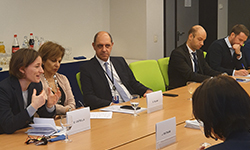 “With the EU-Singapore free trade agreement entered into force about two weeks ago, we now start a new and exciting phase in the bilateral relationship. It is time for European business – and SMEs in particular – to seize the opportunities created by the agreement, which facilitated trade in goods and services, simplified customs procedures, opened up Singapore’s €20 billion public procurement market, protected European intellectual property (such as Geographical Indications), and strengthened commitments to sustainable development”, said Eleonora Catella, Senior Advisor for International Relations, at the European Parliament event ‘Friends of Singapore’ on 4 December, with the presence of the Singaporean Ambassador, Friends of Europe and a number of MEPs. Despite being a small city-state of about 5.6 million people, Singapore is the EU’s 4th-largest trade partner in services after the US, Switzerland and China, and the agreement will benefit companies in sectors such as banking, insurance, telecommunications and transport. “The business community is happy to see that partners like the EU and Singapore are standing together in the face of protectionism to defend our rules-based global order. But there is still work to be done. We urge the European Parliament to see this agreement as a stepping stone to a region-to-region FTA with Southeast Asia, and we call on MEPs to approve the EU-Vietnam agreement as a part of this process”, Catella added.
“With the EU-Singapore free trade agreement entered into force about two weeks ago, we now start a new and exciting phase in the bilateral relationship. It is time for European business – and SMEs in particular – to seize the opportunities created by the agreement, which facilitated trade in goods and services, simplified customs procedures, opened up Singapore’s €20 billion public procurement market, protected European intellectual property (such as Geographical Indications), and strengthened commitments to sustainable development”, said Eleonora Catella, Senior Advisor for International Relations, at the European Parliament event ‘Friends of Singapore’ on 4 December, with the presence of the Singaporean Ambassador, Friends of Europe and a number of MEPs. Despite being a small city-state of about 5.6 million people, Singapore is the EU’s 4th-largest trade partner in services after the US, Switzerland and China, and the agreement will benefit companies in sectors such as banking, insurance, telecommunications and transport. “The business community is happy to see that partners like the EU and Singapore are standing together in the face of protectionism to defend our rules-based global order. But there is still work to be done. We urge the European Parliament to see this agreement as a stepping stone to a region-to-region FTA with Southeast Asia, and we call on MEPs to approve the EU-Vietnam agreement as a part of this process”, Catella added.
Contact: Eleonora Catella
Challenges for the promotion of a competitive and sustainable business in Europe
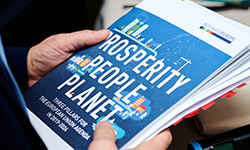 "We are facing numerous challenges, externally and internally. We must join forces to ensure that the European Union remains one of the best places to live, work and do business in the world. Companies have a central role to play and achieving environmental and social goals largely depends on their economic success", said Senior Adviser for Entrepreneurship and SMEs Daniele Olivieri at an event organised by MEP Isabel Benjumea on the "Agenda 2030: challenges for the promotion of a competitive and sustainable business in Europe". The event was attended by MEPs, representatives from the European Commission and major European stakeholders. "BusinessEurope and its member federations are determined to help building a European Union that is prosperous, creates opportunities for all people and takes care of our planet. This is why we propose to articulate the agenda of the European Union in 2019-2024 around three pillars: Prosperity, People and Planet".
"We are facing numerous challenges, externally and internally. We must join forces to ensure that the European Union remains one of the best places to live, work and do business in the world. Companies have a central role to play and achieving environmental and social goals largely depends on their economic success", said Senior Adviser for Entrepreneurship and SMEs Daniele Olivieri at an event organised by MEP Isabel Benjumea on the "Agenda 2030: challenges for the promotion of a competitive and sustainable business in Europe". The event was attended by MEPs, representatives from the European Commission and major European stakeholders. "BusinessEurope and its member federations are determined to help building a European Union that is prosperous, creates opportunities for all people and takes care of our planet. This is why we propose to articulate the agenda of the European Union in 2019-2024 around three pillars: Prosperity, People and Planet".
![]() Contact: Daniele Olivieri
Contact: Daniele Olivieri
Defining business’ role in safeguarding human rights
 “Whilst business clearly has a responsibility to respect human rights, this can be extremely challenging if states do not implement or enforce human rights laws. Therefore, whatever action the EU takes to promote implementation of the UN Guiding Principles on Business and Human Rights, it must respect the distinction between the state responsibility to protect and business responsibility to respect.” This was the key message of Rebekah Smith, Deputy Director for Social Affairs, at the Finnish Presidency conference on 2 December on business and human rights. BusinessEurope also highlighted the need to avoid creating an unlevel playing field between the EU and other parts of the world, as this hampers European companies’ competitiveness. The EU should therefore encourage other countries to implement the UNGPs. Smith concluded, “bearing in mind that each companies’ journey to sustainability is different, it is also important to leave them space to devise due diligence measures which fit their specific situation”. Conference ‘Perspectives paper’ including BusinessEurope’s contribution is available here.
“Whilst business clearly has a responsibility to respect human rights, this can be extremely challenging if states do not implement or enforce human rights laws. Therefore, whatever action the EU takes to promote implementation of the UN Guiding Principles on Business and Human Rights, it must respect the distinction between the state responsibility to protect and business responsibility to respect.” This was the key message of Rebekah Smith, Deputy Director for Social Affairs, at the Finnish Presidency conference on 2 December on business and human rights. BusinessEurope also highlighted the need to avoid creating an unlevel playing field between the EU and other parts of the world, as this hampers European companies’ competitiveness. The EU should therefore encourage other countries to implement the UNGPs. Smith concluded, “bearing in mind that each companies’ journey to sustainability is different, it is also important to leave them space to devise due diligence measures which fit their specific situation”. Conference ‘Perspectives paper’ including BusinessEurope’s contribution is available here.
Contact: Rebekah Smith
Reconfirming commitment to the Roadmap on Carcinogens
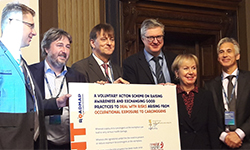 On 28 November, Kris de Meester, Chair of the Health and Safety at Work working group, signed on behalf of BusinessEurope the covenant to the Roadmap on Carcinogens which prolongs its existence until 2022. Started in 2016, the Roadmap promotes good practices and solutions to protect workers’ health against exposure to carcinogens substances. By signing this covenant, BusinessEurope reiterated its commitment to ensure healthy workplaces and good working conditions for all EU workers.
On 28 November, Kris de Meester, Chair of the Health and Safety at Work working group, signed on behalf of BusinessEurope the covenant to the Roadmap on Carcinogens which prolongs its existence until 2022. Started in 2016, the Roadmap promotes good practices and solutions to protect workers’ health against exposure to carcinogens substances. By signing this covenant, BusinessEurope reiterated its commitment to ensure healthy workplaces and good working conditions for all EU workers.
Contact: Jessie Fernandes
Calendar
- 2-13 December: United Nations Framework Convention on Climate Change - COP25 in Madrid
- 12 December: UK general elections
- 12-13 December: European Council
Reminder: please have a look at our privacy policy